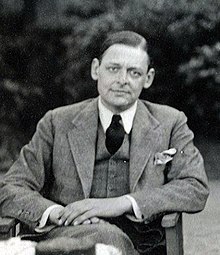T.S. Eliot
| T. S. Eliot | |
|---|---|

Eliot in 1934
|
|
| Born | Thomas Stearns Eliot 26 September 1888 St. Louis, Missouri, U.S. |
| Died | 4 January 1965 (aged 76) Kensington, London, England |
| Occupation | Poet, dramatist, literary critic, editor |
| Citizenship | American by birth; British from 1927 |
| Education | AB in philosophy (Harvard, 1909) PhD (cand) in philosophy (Harvard, 1915–16) |
| Period | 1905–1965 |
| Literary movement | Modernism |
| Notable works | "The Love Song of J. Alfred Prufrock" (1915), The Waste Land (1922), Four Quartets (1943) |
| Notable awards | Nobel Prize in Literature (1948), Order of Merit (1948) |
| Spouse |
Vivienne Haigh-Wood (m. 1915; sep. 1932) Esmé Valerie Fletcher (m. 1957–65) |
|
|
|
| Signature | |
Thomas Stearns Eliot OM (26 September 1888 – 4 January 1965) was a British essayist, publisher, playwright, literary and social critic, and "one of the twentieth century's major poets". He moved from his native United States to England in 1914 at the age of 25, settling, working, and marrying there. He was eventually naturalised as a British subject in 1927 at the age of 39, renouncing his American citizenship.
Eliot attracted widespread attention for his poem "The Love Song of J. Alfred Prufrock" (1915), which was seen as a masterpiece of the Modernist movement. It was followed by some of the best-known poems in the English language, including The Waste Land (1922), "The Hollow Men" (1925), "Ash Wednesday" (1930), and Four Quartets (1943). He was also known for his seven plays, particularly Murder in the Cathedral (1935). He was awarded the Nobel Prize in Literature in 1948, "for his outstanding, pioneer contribution to present-day poetry".
The Eliots were a Boston family with roots in Old and New England. Thomas Eliot's paternal grandfather, William Greenleaf Eliot, had moved to St. Louis, Missouri to establish a Unitarian Christian church there. His father, Henry Ware Eliot (1843–1919), was a successful businessman, president and treasurer of the Hydraulic-Press Brick Company in St Louis; his mother, Charlotte Champe Stearns (1843–1929), wrote poetry and was a social worker, a new profession in the early 20th century.
...
Wikipedia
